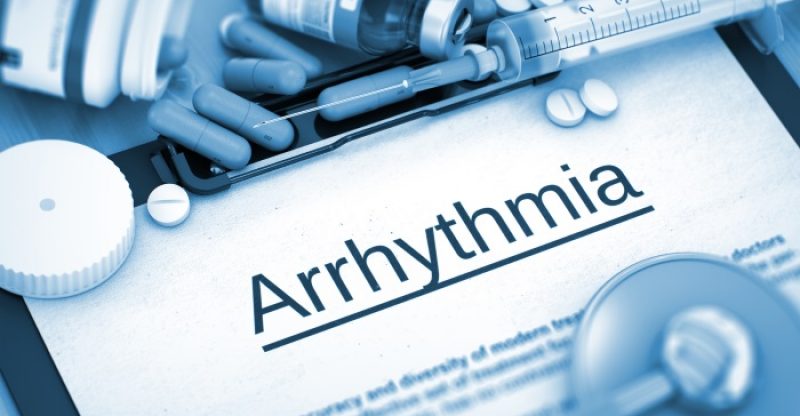Irregular Heartbeat Symptoms, Causes, Risk Factors and Remedies
There is a variety of reasons that millions of people experience an irregular heartbeat each year.
Irregular heartbeat or arrhythmia affects about one-quarter of adults over 40, particularly those who are under stress who have some type of heart disease (1).
While most incidences of irregular heartbeat are not serious, some types of arrhythmia are severe and require medical attention.
Knowing your risk factors, as well as how to treat some common types of arrhythmias, will help you minimize your risk and keep your heart beating steadily.
Our guide gives you all the information you need on arrhythmia, as well as many natural treatments you can use to treat this often harmless condition.
Understanding the importance of having an arrhythmia could save your life or that of someone you love, so be sure you understand this common sign.
Understanding Irregular Heartbeat
Your heart is comprised of two upper chambers, called the atria, and two lower chambers called the ventricles.
Together, these four chambers are powered by electrical signals that spread from the top to the bottom of your heart to contract and pump blood throughout your heart and body.
This electrical impulse is an essential part of your heartbeat, as is the opening and closing of each of the valves within your heart as blood is pushed through the various chambers.
Irregular heartbeat means any rhythm that is not steady and can include your heart beating too slow, too quickly, or in an irregular pattern.
The most common type of arrhythmia is extra or premature heartbeats.
If you’ve ever felt like your heart skipped a beat or there is a fluttering in your chest, you have likely experienced this type of arrhythmia.
Most of the time, it is harmless, especially in healthy individuals, and many people do not even notice symptoms.
The most common causes of these types of premature beats are too much nicotine or caffeine, over-exercising, and stress.
If your heart is beating too quickly, this is known as tachycardia, and if it is beating too slowly, you have bradycardia.
As the electrical impulses that control heartbeat travel from the top to the bottom of your heart, they can become blocked, delayed, or rerouted (2).
When this happens occasionally and lasts for a few seconds, there is generally nothing about which to worry.
When these periods of fast or slow heart rate last longer or happen very frequently, you could have a cardiac problem that needs medical attention.
Symptoms of arrhythmia range widely from no noticeable signs to a fatal cardiac episode.
While random and infrequent bouts of arrhythmia are usually harmless, when the events happen so frequently that they are impacting your heart production and output, you could develop more serious symptoms.
These include:
- Dizziness;
- Fatigue;
- Feeling lightheaded;
- Feeling faint;
- Pounding or rapid heartbeat;
- Sweating;
- Feeling short of breath;
- Pains in your chest;
- Cardiac arrest, in severe cases.
If arrhythmia continues for extended periods or is not able to return to a normal rhythm on its own, it may mean your heart cannot pump sufficient amounts of blood; this may damage organs, your brain, or your heart.
Paying attention to arrhythmia is an essential first step, but understanding your risk factors and recognizing other symptoms will also be helpful in treating this disorder.
Causes and Risk Factors
Those who smoke may experience arrhythmia from the carbon monoxide found in cigarette smoke, or the oxidative stress created from smoking.
Those who smoke are also more likely to have other causes of an irregular heartbeat, including chronic obstructive pulmonary disease and coronary artery disease (4).
Stress is known to raise blood pressure and elevate levels of cortisol, the stress hormone, in your blood.
These both make your heart work harder.
In addition, stress activates the sympathetic nervous system, which can trigger arrhythmia.
As many as two in five deaths from sudden cardiac malfunction can be linked to acute psychological stress (5).
While occasional, moderate alcohol consumption is generally considered safe, heavy consumption and alcoholism can increase your risk for sudden death from a fatal cardiac arrhythmia.
The relationship between alcohol consumption and arrhythmia is complex and includes damage to the heart muscle as well as interference with the electrical impulses that govern heart rate (6).
Nearly all illegal drugs have an effect on heart rhythm.
Even prescription medications can sometimes cause arrhythmia.
Many cardiac arrhythmias from illegal drug use can be fatal (7).
As you age, your risk for cardiac arrhythmias increases.
The most serious incidences of irregular heartbeat generally affect those over the age of 60.
As you age, your heart is more likely to be affected by years of poor diet, elevated cholesterol, high blood pressure, and other factors that affect the condition of your heart muscles.
Your age also influences the severity of arrhythmias, with older people experiencing more severe irregularities in their heartbeat (8).
Being overweight or obese also places extra strain on your heart, forcing it to work harder continually.
Obesity raises your chances of being sedentary, having high blood sugar or blood pressure, or having diabetes, all of which are significant risk factors for arrhythmia.
If you have any condition that influences or controls your cardiac electrical system, this can cause arrhythmia.
These conditions include:
- Congestive heart failure;
- Myocardial infarction, or heart attack;
- Any congenital heart defect;
- An infection that damages the heart tissue or sac surrounding the heart;
- High blood pressure;
- Diabetes, both Type 1 and Type 2;
- Thyroid problems;
- Sleep apnea.
Conventional Treatments
If your arrhythmia is accompanied by chest pains, fainting, or dizziness, you may need to seek treatment from your doctor or cardiologist.
Your doctor will likely perform an exam, listen to your heart, and monitor the rate and rhythm of your heart.
Your doctor will want to listen for a murmur or evidence of unusual or extra heartbeats.
He or she may also check for signs of swelling in your feet or legs, as this can be indicative of heart failure.
Some tests may be performed to check for heart problems.
An electrocardiogram, or EKG, is the most common test, as it measures the electrical activity in your heart.
This helps your doctor understand the timing and strength of each electrical impulse that is guiding your heartbeat.
Your doctor may also ask you to wear a cardiac monitor for up to three days to monitor suspicious fluttering or other arrhythmias.
Once your doctor understands the nature and severity of your arrhythmia, he or she may suggest a treatment plan that could include the use of medicine, a medical procedure, or surgery to help correct or treat the underlying cause of your irregular heartbeat.
The following are the most common of these types of medical treatments for arrhythmia.
Medication
Medications to treat arrhythmia, known as antiarrhythmics, are used to change your heartbeat from an irregular, too fast, or too slow rate to one that is steadier.
Depending on the nature of your arrhythmia, you may be prescribed beta-blockers, which slow down your heartbeat, or calcium channel blockers, which also reduce heart rate.
Like most prescription medications, these come with some adverse side effects of which you should be aware before starting them.
Because medications only treat the symptom of arrhythmia, not the underlying cause, you may have to take these medications for life, or your doctor may also suggest a medical procedure to address the cause of your irregular heartbeat.
Procedures and Surgery
If your heart rate is irregular due to certain conditions, a pacemaker may be used to help treat your arrhythmia.
A pacemaker is placed under the skin in your chest and attached to your heart.
Its primary function is to control the electrical impulses that dictate your heartbeat.
When a pacemaker detects an abnormal rhythm, it sends an electrical signal, like those your heart naturally sends, to regulate your rhythm.
If your heart rate is slower than usual, your doctor may recommend a pacemaker.
Heart attacks and other cardiac conditions can damage the heart muscle, necessitating a pacemaker (9).
If your heartbeat is irregular because of other issues, such as malignant ventricular arrhythmia, your cardiologist may recommend an implantable defibrillator.
Like a pacemaker, this device is placed under the skin and provides electrical stimulation to help restore a regular, normal rhythm to your heart.
If your condition puts you at serious risk of death from an arrhythmia, your doctor may suggest defibrillation for your treatment plan (10).
When your arrhythmia is caused by small areas that send out improper electrical signals, your cardiologist may recommend a catheter ablation procedure.
In this treatment, energy is used to make small scars in the tissue of your heart; this prevents some types of abnormal electrical impulses from moving through your heart and causing arrhythmia (11).
When these procedures or medication are not helpful in correcting your arrhythmia, you may require surgery.
Usually, an operation is performed to improve the overall flow of blood to the heart muscle, to repair a heart valve, or to correct other heart problems.
Maze surgery is a standard procedure performed to correct arrhythmias, as it creates a new pathway for electrical impulses that are causing an irregular heartbeat (12).
As with any surgery to the heart, these are dangerous procedures that may require prolonged recovery periods.
Natural Treatments
When medication or a medical procedure or surgery are unnecessary to treat your arrhythmia, other, more natural treatments can be used to stimulate a more normal heart rate.
The following are our favorite natural treatments that may help with your arrhythmia, depending on its type and severity.
It is Time to Quit
If you are a smoker, it is time to quit.
Smoking is the number one preventable cause of death in the U.S., and quitting smoking can significantly enhance not only the health of your heart but also your lungs, brain, and other organs.
Because smoking plays a significant role in arrhythmia, quitting can go a long way toward eliminating your irregular heartbeat (13).
Focus on a Healthy Diet
The majority of people with an irregular heartbeat also have some kind of heart problem, such as heart disease.
Eating a healthy diet is one way to improve your overall heart health and help treat your arrhythmia.
A heart-healthy diet includes foods low in cholesterol and unhealthy fats, and high in anti-inflammatory compounds.
You also want to eat foods rich in antioxidants, which can boost your immune system and prevent disease and infection.
The following are foods that should be included in any heart-healthy diet:
- All types of vegetables;
- All types of fruits;
- Foods high in fiber;
- Foods high in antioxidants;
- Herbs and spices;
- Beans, legumes, nuts, and seeds;
- Lean proteins;
- Healthy fats rich in omega-3 fatty acids;
- Dairy products made from raw milk;
- Eat more potassium;
- Increase your consumption of heart-healthy celery, garlic, and onions;
- Eat more magnesium-rich foods.
In addition to consuming the above components of a healthy diet, you will also want to reduce drastically your intake of salt, reduce the number of saturated fats you eat and avoid trans fats altogether.
Get Moving
Regular exercise benefits all parts of your body, including promoting cardiovascular health.
Moving your body regularly can reduce blood pressure, improve your cholesterol and triglyceride levels, lower blood sugar, and reduce your risk of heart disease (14).
Daily physical activity is necessary for heart health, and if you have had an arrhythmia, work with your doctor to create an exercise regimen that will work with your condition.
Watch Your Weight
Those who are overweight or obese are more likely to suffer from atrial fibrillation, which is the most common type of arrhythmia.
If you are overweight, you are more likely to have cardiovascular problems, and carrying extra weight increases the chances of your having many conditions that contribute to arrhythmia.
If you are overweight, losing the excess pounds can help reduce your arrhythmia significantly (15).
Stimulate the Vagus Nerve
Your involuntary nervous system controls bodily functions, such as heartbeat.
The vagus nerve runs from your abdomen to your brain stem, and you can stimulate this verve using various maneuvers.
When you stimulate the vagus, it releases a neurotransmitter called acetylcholine, which slows the electrical signals that control heart rate (16).
These non-invasive techniques can stop an irregular heartbeat, in some cases.
Not everyone will experience success with all maneuvers, so try them until you find one or more that work for you.
Here are some of our favorite vagal techniques.
- Bear down like you are trying to have a bowel movement.
- Blow through a straw.
- A cough forcefully, and for a sustained period.
- Immerse your face in the cold water for ten seconds, or place an ice pack over your face.
- Use a tongue depressor to touch quickly the back of your throat, stimulating a gag reflex.
- Massage the carotid arteries in your neck in a circular motion for ten seconds.
Lower Your Stress
Stress management can play an essential role in treating your arrhythmia.
Eliminating the source or sources of stress is an excellent first step, but learning how to cope with emotional stress is also helpful.
While each person finds different activities relaxing, consider trying meditation, yoga, prayer, or exercise to help you lower your stress and treat your arrhythmia (17).
Watch Your Caffeine Intake
Drinking too much caffeine can definitely contribute to heart palpitations.
Cutting back on caffeine from coffee, tea, energy drinks, and other sources will be helpful in keeping your heart rate steady and normal.
If you are a regular coffee drinker, consider switching to decaffeinated or a half-caff blend each day to control a racing heart.
Try Acupuncture
A review of the literature on acupuncture success indicates that it can be successful in converting people with arrhythmia to a normal heart rhythm.
Acupuncture has been used for centuries to treat a variety of medical and mental health problems, and it is known to improve cardiovascular functioning in many people (18).
Take Supplements
You can help boost the supply of blood to your heart and reduce cardiovascular risk factors by taking dietary supplements.
Often, our daily diets do not supply us with the necessary nutrition to sustain a healthy heart, so taking supplements can be a natural way to treat an arrhythmia.
In addition to taking a daily dosage of Vitamin D and fish oil, which have numerous health benefits and support your heart, you should also consider taking the following supplements regularly to treat your arrhythmia.
In many cases, irregular heartbeat could be due, in part, to magnesium deficiency.
Magnesium contributes to heart health by improving oxygen supply and providing the heart muscle with more energy.
For best results, take up to 250 milligrams three times per day.
Your body more readily absorbs supplements in citrate, malate, and aspartate form.
Another heart-healthy nutrient is coenzyme Q10, also called CoQ10.
For those with angina, CoQ10 has been shown to reduce attacks.
Taking up to 300 milligrams every day can help your heart have the energy it needs to maintain a steady heartbeat.
The berries and extract from the hawthorn plant are beneficial for all types of heart problems.
Like CoQ10, they help with angina, and also lower blood pressure and cholesterol levels.
Selenium deficiency can cause a number of problems, including cardiomyopathy.
Those deficient in iodine are also likely to have trouble with an irregular heartbeat, and other issues.
While both of these nutrients used to be common in food, soil depletion in modern agriculture means you get less of these in the foods you eat than ever before.
Taking coral calcium means you will get a healthy dose of both selenium and iodine, plus other heart-healthy minerals and vitamins like potassium, calcium, copper, magnesium, and vitamins A, B, C, D, and E.
Try Cayenne Pepper
Cayenne is not just for adding spice to your food.
It can promote healthy heart activity, including a regular heart rate.
Cayenne increases blood flow, which can stop arrhythmia and may even shock your heart back into a normal rhythm.
Cayenne has been used for many medical purposes in cultures all over the world for hundreds of years.
If you are experiencing irregular heartbeat for an extended period, mix one teaspoon of cayenne pepper with a glass of warm water, then drink it quickly.
While your mouth may be hot, your heart will experience the benefits, and will likely return to a normal rhythm quickly.
Precautions
While most arrhythmias are not serious, some irregular heartbeats can be a sign of a life-threatening condition.
If you are experiencing a fluttering or skipping heartbeat, or have a rate that is either too slow or too fast for extended periods, see your doctor immediately.
If you begin experiencing other symptoms, such as shortness of breath, chest pain, or other symptoms of a cardiac episode, seek immediate medical attention.
While occasional heart flutter is not usually something to be concerned with, other symptoms of arrhythmia can mean a more serious cardiac condition.
If you are over 60, overweight, smoke, are sedentary, use drugs, or drink alcohol, you are at risk for a cardiac arrhythmia.
Arrhythmia includes heartbeats that are irregular because they beat too fast, too slow, or have an unsteady rhythm.
Some arrhythmias may require conventional treatment, such as medication or a medical procedure, or surgery.
Medications only treat the symptom of arrhythmia, while procedures and surgery attempt to address the underlying cause of the irregular heartbeat.
Only in some instances does an arrhythmia warrant medical intervention with a procedure or surgery, such as a pacemaker or implanted defibrillator.
Treating irregular heartbeat can be as simple as improving your overall heart health by eating better, quitting smoking, being more active, and reducing stress.
In some cases, taking supplements or using other natural remedies may also help with your arrhythmia.
FDA Compliance
The information on this website has not been evaluated by the Food & Drug Administration or any other medical body. We do not aim to diagnose, treat, cure or prevent any illness or disease. Information is shared for educational purposes only. You must consult your doctor before acting on any content on this website, especially if you are pregnant, nursing, taking medication, or have a medical condition.
HOW WOULD YOU RATE THIS ARTICLE?






